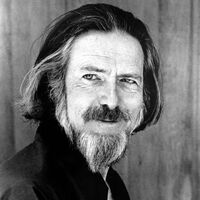Listen, there’s something I must tell. I’ve never, never seen it so clearly. But it doesn’t matter a bit if you don’t understand, because each one of you is quite perfect as you are, even if you don’t know it. Life is basically a gesture, but no one, no thing, is making it. There is no necessity for it to happen, and none for it to go on happening. For it isn’t being driven by anything; it just happens freely of itself. It’s a gesture of motion, of sound, of color, and just as no one is making it, it isn’t happening to anyone. There is simply no problem of life; it is completely purposeless play – exuberance which is its own end. Basically there is the gesture. Time, space, and multiplicity are complications of it. There is no reason whatever to explain it, for explanations are just another form of complexity, a new manifestation of life on top of life, of gestures gesturing. Pain and suffering are simply extreme forms of play, and there isn’t anything in the whole universe to be afraid of because it doesn’t happen to anyone! There isn’t any substantial ego at all. The ego is a kind of flip, a knowing of knowing, a fearing of fearing. It’s a curlicue, an extra jazz to experience, a sort of double-take or reverberation, a dithering of consciousness which is the same as anxiety.
